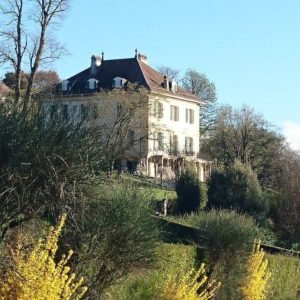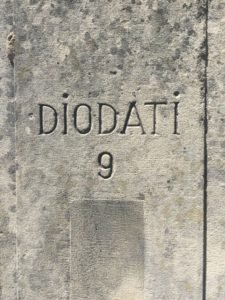Romanticists in Lockdown: Then and Now
Week eight of lockdown in the UK. Most of us are still stuck at home; passive bystanders as we watch the world wrestle with an invisible foe. But now we have a new mantra: “Stay Alert; Control the Virus; Save Lives”.The lives we save will differ exponentially from the lives we held before. In academia, it will probably be a long time until we next see our students sat in a packed lecture theatre. In everyday life, it will probably be a long time before we hug friends without feeling slightly worried that we may unwittingly pass on the virus. We’ll probably never be able to stop feeling slightly cautious when someone stands a bit too close to us in a supermarket queue, with our new notion of “too close” being a lot further away than it once was.In times like this, it’s easy to be side-tracked by our anxiety for the future. But I, instead, have been thinking about the past.204 years ago, in the summer of 1816, a different group of poetry lovers were confined indoors under rather different circumstances. Lord Byron, John Polidori, Mary Godwin, Claire Clairmont, and Percy Shelley were in the Villa Diodati on Lake Geneva - a slightly more luxurious lockdown than the one most of us are in, but a lockdown nonetheless. 1816 was known as the ‘Year Without a Summer’. The eruption of Mount Tambora in Indonesia caused a huge cloud of ash to sweep around the globe, dimming the sun throughout Europe. In Geneva, this culminated in the wettest summer since Swiss records began. This global catastrophe was one of the most powerful volcanic eruptions ever recorded, and it continued to affect the climate for years after its eruption. To this day, it is believed to be one of the greatest environmental disasters to ever happen.The Coronavirus Pandemic will probably be viewed as the greatest disaster of our time and will impact future generations long after we’re gone. Our summer in the sunshine, however, has been stolen by quarantine and self-isolation rather than the rain.In her 1831 Introduction to Frankenstein, Mary writes:
1816 was known as the ‘Year Without a Summer’. The eruption of Mount Tambora in Indonesia caused a huge cloud of ash to sweep around the globe, dimming the sun throughout Europe. In Geneva, this culminated in the wettest summer since Swiss records began. This global catastrophe was one of the most powerful volcanic eruptions ever recorded, and it continued to affect the climate for years after its eruption. To this day, it is believed to be one of the greatest environmental disasters to ever happen.The Coronavirus Pandemic will probably be viewed as the greatest disaster of our time and will impact future generations long after we’re gone. Our summer in the sunshine, however, has been stolen by quarantine and self-isolation rather than the rain.In her 1831 Introduction to Frankenstein, Mary writes:
“it proved a wet, ungenial summer, and incessant rain often confined us for days to the house. Some volumes of ghost stories, translated from the German into French, fell into our hands. […] "We will each write a ghost story," said Lord Byron; and his proposition was acceded to. […] I busied myself to think of a story, —a story to rival those which had excited us to this task. One which would speak to the mysterious fears of our nature, and awaken thrilling horror—one to make the reader dread to look round, to curdle the blood, and quicken the beatings of the heart. If I did not accomplish these things, my ghost story would be unworthy of its name. I thought and pondered—vainly. […] Have you thought of a story? I was asked each morning, and each morning I was forced to reply with a mortifying negative”.
As many of you will know, this infamous ghost story competition lead to the creation of two of the most influential works of Gothic literature: Mary Shelley’s Frankenstein (1818) and John Polidori’s The Vampyre (1819). The authors of these respective novels took the monsters in their lives and fashioned them into literary works. Their protagonists subscribed to an alternate mantra: ‘Stay Alert; Control the Monster; Save Lives’. With today’s pressures and stresses, our remote working and Zoom meetings, and our ever-growing to-do lists, most of us are unable to dedicate a significant amount of time to a competition of this kind – and I’m definitely not advocating the substance abuse that the writers at the Villa Diodati potentially may have indulged in! However, as we move into Week 8 of the COVID-19 lockdown and our own “ungenial summer”, I propose that we all set aside some time for ourselves to be creative. If you’re struggling with your own monsters then this could even be quite cathartic.You don’t need to create a new genre (although feel free to try – and do send me your efforts!); you don’t even need to succeed at whatever creative endeavour you apply yourself to – choose something new or something you used to enjoy; but, whatever you choose to do, commit yourself to it, turn off the news, and enjoy the freedom of immersing yourself in the arts first hand.Stay safe! Eleanor Bryan is an Associate Lecturer and PhD student at the University of Lincoln. Her PhD thesis concerns dramatic adaptations of Frankenstein and Dracula, and her wider research interests include Romanticism, Edwardian literature, and cinematic adaptation. Eleanor is curator of the BARS Romantic Reimaginings Blog and is Communications Fellow for the K-SAA.Email: ebryan@lincoln.ac.uk; Twitter: @EleanorBryan
With today’s pressures and stresses, our remote working and Zoom meetings, and our ever-growing to-do lists, most of us are unable to dedicate a significant amount of time to a competition of this kind – and I’m definitely not advocating the substance abuse that the writers at the Villa Diodati potentially may have indulged in! However, as we move into Week 8 of the COVID-19 lockdown and our own “ungenial summer”, I propose that we all set aside some time for ourselves to be creative. If you’re struggling with your own monsters then this could even be quite cathartic.You don’t need to create a new genre (although feel free to try – and do send me your efforts!); you don’t even need to succeed at whatever creative endeavour you apply yourself to – choose something new or something you used to enjoy; but, whatever you choose to do, commit yourself to it, turn off the news, and enjoy the freedom of immersing yourself in the arts first hand.Stay safe! Eleanor Bryan is an Associate Lecturer and PhD student at the University of Lincoln. Her PhD thesis concerns dramatic adaptations of Frankenstein and Dracula, and her wider research interests include Romanticism, Edwardian literature, and cinematic adaptation. Eleanor is curator of the BARS Romantic Reimaginings Blog and is Communications Fellow for the K-SAA.Email: ebryan@lincoln.ac.uk; Twitter: @EleanorBryan

